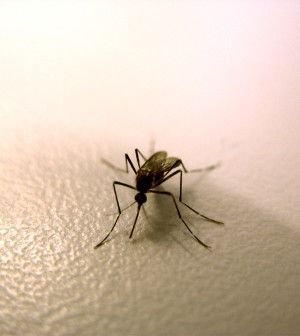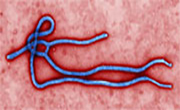- Could Artificial Sweeteners Be Aging the Brain Faster?
- Techniques for Soothing Your Nervous System
- Does the Water in Your House Smell Funny? Here’s Why
- Can a Daily Dose of Apple Cider Vinegar Actually Aid Weight Loss?
- 6 Health Beverages That Can Actually Spike Your Blood Sugar
- Treatment Options for Social Anxiety Disorder
- Understanding the Connection Between Anxiety and Depression
- How Daily Prunes Can Influence Cholesterol and Inflammation
- When to Take B12 for Better Absorption and Energy
- Epsom Salts: Health Benefits and Uses
New Ebola Vaccine Shows Promise in Human Trials


An experimental Ebola vaccine shows promise in an early clinical trial, but requires much more testing, researchers report.
The trial included 120 healthy adults in China who received either a low or high dose of the vaccine, or a placebo. Twenty-eight days later, 38 of 40 people in the low-dose group and all 40 of those in the high-dose group showed an immune response to the vaccine.
No serious side effects occurred among the participants who received the vaccine.
While the results suggest the vaccine is effective and safe, more long-term testing is needed to determine whether it can actually protect people against Ebola, according to the authors of the study published March 25 in The Lancet.
The vaccine is based on the strain of Ebola that has been circulating in the West African outbreak. The researchers note that, until now, all tested Ebola vaccines have been based on the Ebola strain from the 1976 outbreak in Zaire.
The vaccine was developed by the Beijing Institute of Biotechnology and Tianjin CanSino Biotechnology in China. Both helped fund the study, along with China National Science and Technology.
“On the basis of our findings, we believe that the Ebola vaccine we assessed has some potential, and a significant advantage of this type of vaccine is that [it is] stable and much easier to store or transport in tropical areas with inadequate cold-chain capacity, such as Africa,” research team leader Fengcai Zhu, from the Jiangsu provincial center for disease prevention and control in China, said in a journal news release.
“However, whether this candidate vaccine could become a final vaccine for widespread use against Ebola outbreaks is still uncertain,” Zhu added. “Furthermore, these results only assess immune response up to 28 days, so we plan to assess the persistence of the specific immune response by following up the vaccine recipients of this study.”
Still, two experts said the development of the vaccine is a testament to how scientists can effectively respond in a crisis.
This vaccine, “is an example of how quickly existing vaccine platforms can be modified to incorporate a new virus strain, and moved, with minimum testing in animals, into trials in humans during a crisis situation,” Andrea Marzi, of the U.S. National Institute of Allergy and Infectious Diseases, and Darryl Falzarano, of the University of Saskatchewan in Canada, wrote in an accompanying commentary.
“However…ultimately, the effectiveness of all these vaccines will only become clear when they proceed to phase 2 efficacy trials in outbreak regions,” they added.
The West African Ebola outbreak, while ebbing, is not yet over. According to the U.S. Centers for Disease Control and Prevention, almost 25,000 probable or confirmed cases have been detected in Guinea, Liberia and Sierra Leone, including more than 10,000 deaths.
More information
The U.S. Centers for Disease Control and Prevention has more about Ebola.
Source: HealthDay
Copyright © 2026 HealthDay. All rights reserved.










